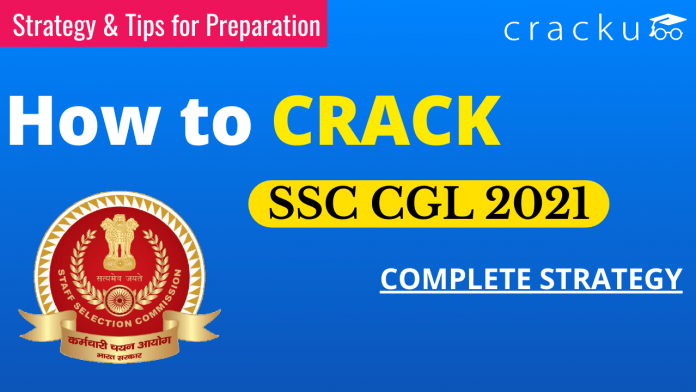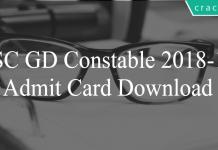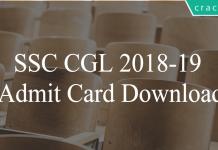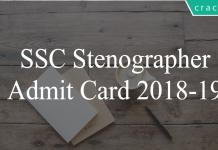Contents
How to Prepare for SSC CGL Tier-1 (Strategy and Preparation Tips)
The staff selection commission(SSC) is expected to release the official notification for the Combined Graduation Level (CGL – 2021) on 29 December 2020. SSC CGL application form 2021 will be available for filling the application form from then. An applicant who is eligible & interested in the exam can start preparing for the exam from now. Exams dates for CGL Tier-1: 29 May to 07 June 2021
The first thing an aspirant must know before starting his preparation is the pattern of the exam. Let us have a look at the pattern of the exam before moving on to how to prepare for SSC CGL 2021 Exam.
Get 210 SSC Mocks at Just Rs.299
Examination Pattern:
The Examination will be conducted in four tiers as indicated below:
Tier-I: Computer Based Examination
Tier-II: Computer Based Examination
Tier-III: Pen and Paper Mode (Descriptive paper)
Tier-IV: Computer Proficiency Test/ Data Entry Skill Test (wherever applicable).SSC CGL Tier -1 Exam Pattern
| S.No | Subject | Number of Questions | Maximum Marks | Time allowed |
| 1 | General Intelligence & Reasoning | 25 | 50 | 1 Hour |
| 2 | General Awareness | 25 | 50 | |
| 3 | Quantitative Aptitude | 25 | 50 | |
| 4 | English Comprehension | 25 | 50 |
Note :
1) The negative marking of 0.5 marks for each and every wrong answer.
2) Marks will not be deducted if the questions not attempted by the candidate.
3) There is no sectional cut off.
SSC CGL Tier –2 Exam Pattern
| S.No | Subject | Number of Questions | Maximum Marks | Time allowed |
| 1 | Paper-I: Quantitative Abilities | 100 | 200 | 2 Hours |
| 2 | Paper-II: English Language and Comprehension | 200 | 200 | 2 Hours |
| 3 | Paper-III: Statistics | 100 | 200 | 2 Hours |
| 4 | Paper-IV: General Studies (Finance and Economics) | 100 | 200 | 2 Hours |
Note:
1) There will be a negative marking of 0.25 for each and every wrong answer.
2) Marks will not be deducted if the questions not attempted by the candidate.
3) There is no sectional cut off.
SSC CGL Tier –3 Exam Pattern:
| S.No | Mode of Examination | Scheme of Examination | Maximum Marks | Time allowed |
| 1 | Pen and Paper mode | Descriptive Paper in English or Hindi (Writing of Essay/ Precis/ Letter/ Application etc.) | 200 | 1 Hour |
SSC CGL Tier –4 Exam Pattern (Skill Test):
- Computer Proficiency Test (CPT) and Data Entry Speed Test (DEST) will be conducted.
SSC CGL 2021 Preparation Strategy:
SSC conducts the CGL Exam in 4 Tiers.
The Tier 1 Exam consists of 4 sections. Each section carries 25 questions of 2 marks each. SSC deducts one-fourth of the mark allotted for the question for a wrong answer (0.5 marks in this case). The exam does not have any sectional cut-offs. SSC uses the score of an aspirant in the Tier 1 exam till the final selection.
The Tier 2 Exam consists of 4 papers.
The English language paper contains 200 questions of 1 mark each. SSC deducts 0.25 marks for every wrong answer. The Maths paper consists of 100 questions of 2 marks each. SSC deducts 0.5 marks for every wrong answer in this paper. The time duration for each paper is 2 hours.
All the candidates must take these 2 papers. Paper 3 (Statistics) is only for candidates who have opted for “Statistical investigator & compiler”. Paper 4 (General studies – Finance and Economics) is only for candidates who have opted for Assistant Audit Officer (AAO).
The tier 3 exam is a descriptive test of 1 hour for 100 marks.
The tier 4 exam consists of a Data entry speed test (DEST) and computer proficiency test (CPT). For most of the posts, these tests are of qualifying nature.
SSC prepares the final merit list using the cumulative scores of the aspirant in tier 1, tier 2 and tier 3 exam.
As we can see, the English language and Maths account for about 500 marks of the total 700 marks.
Preparation Tips for SSC CGL Tier-1
How to prepare for English Section:
The English section is not comprehension heavy like banking exams. Therefore, aspirants must be thorough with the grammar topics. The topics that one must prepare for to ace this section are direct to indirect speech, active to passive voice, common errors in English usage.
Apart from these topics, one can expect questions from reading comprehension and para jumbles. Having a reading habit helps a great deal in answering these questions.
How to prepare for the Quantitative Aptitude Section:
SSC asks questions from almost all the topics under the Quants section. Aspirants can get a detailed account of the various topics that appear in the exam and the method to prepare for each topic by going through a Quantitative aptitude for SSC CGL.
How to prepare for the Reasoning Section:
The reasoning section accounts for a total of 50 marks in the exam. The questions that appear are usually of the stand-alone type. SSC usually refrains from asking puzzles. The questions are usually simple in this section. The reasoning for SSC CGL can help aspirants to know how to prepare for this section in detail.
How to prepare for General Awareness Section:
Most of the questions in this section are static by nature. The GA section of SSC CGL is radically different from the GA section of banking exams. More often than not, this section turns out to be the make or break section in the prelims exam.
As the return on time invested during the exam is very high, aspirants must try to maximise their scores in this section. GK compendium for competitive exams and general awareness for SSC CGL can help aspirants to prepare well for this section.
Download SSC CGL Previous Papers PDF
Topics for preparing – SSC CGL Tier-1
General Intelligence & Reasoning:
- Analogies, similarities and differences, space visualisation, spatial orientation, problem-solving, analysis, judgement, decision making, visual memory.
- Discrimination, observation, relationship concepts, arithmetical reasoning and figural classification, arithmetic number series, non-verbal series, coding and decoding, statement conclusion, syllogistic reasoning etc.
- Semantic Analogy, Symbolic/ Number Analogy, Figural Analogy, Semantic Classification, Symbolic/ Number Classification, Figural Classification.
- Semantic Series, Number Series, Figural Series, Problem Solving, Word Building, Coding & Decoding.
- Numerical Operations, symbolic Operations, Trends, Space Orientation, Space Visualisation, Venn Diagrams, Drawing inferences.
- Punched hole/ pattern- folding & Unfolding, Figural Pattern-folding and completion, Indexing, Address matching, Date & city matching.
- Classification of centre codes/ roll numbers, Small & Capital letters/ numbers coding, decoding and classification, Embedded Figures, Critical thinking, Emotional Intelligence, Social Intelligence.
General Awareness:
- Questions in this component will be aimed at testing the candidates’ general awareness of the environment around them and its application to society.
- Questions will also be designed to test knowledge of current events and of such matters of everyday observations and experience in their scientific aspect as may be expected of any educated person.
- The test will also include questions relating to India and its neighbouring countries especially pertaining to History, Culture, Geography, Economic Scene, General Policy & Scientific Research.
Quantitative Aptitude:
- The scope of the test will be computation of whole numbers, decimals, fractions and relationships between numbers, Percentage.
- Ratio & Proportion, Square roots, Averages, Interest, Profit and Loss, Discount, Partnership Business, Mixture and Al-ligation.
- Time and distance, Time & Work, Basic algebraic identities of School Algebra & Elementary surds, Graphs of Linear Equations.
- Triangle and its various kinds of centres, Congruence and similarity of triangles, Circle and its chords, tangents, angles subtended by chords of a circle.
- Common tangents to two or more circles, Triangle, Quadrilaterals, Regular Polygons, Circle, Right Prism, Right Circular Cone, Right Circular Cylinder, Sphere, Hemispheres, Rectangular Parallelised, Regular Right Pyramid with a triangular or square base.
- Trigonometric ratio, Degree and Radian Measures, Standard Identities, Complementary angles, Heights and Distances, Histogram, Frequency polygon, Bar diagram & Pie chart.
English Comprehension:
- Candidates’ ability to understand correct English, their basic comprehension and writing ability, etc. would be tested.
- The questions in Parts A, B, & D will be of a level commensurate with the essential qualification viz. Graduation and questions in Part-C will be of 10th standard level





